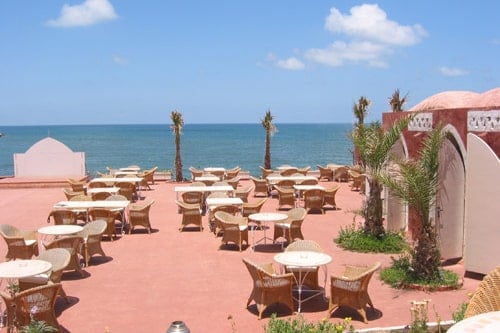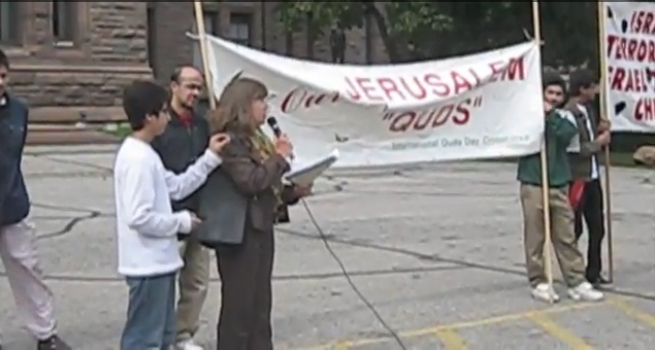I think Barry Rubin has the best assessment of the
recent vote at the UN General Assembly in favour of declaring Palestine a state…
Twenty-four years ago, almost to the day, in 1988, I stood in a large hall in Algeria and saw Yasir Arafat declare the independence of a Palestinian state. And that was forty-one years, almost to the day, after the UN offered a Palestinian state in 1947. Twelve years ago Israel and the United States officially offered a Palestinian state as part of a compromise at deal in the Camp David summit of 2000.
Arguably, despite all their errors, the Palestinian movement has made
progress since those events, though it is not very impressive progress. Yet in
real terms there is no real Palestinian state; the movement is more deeply
divided than at any time in its history; and the people aren't doing very
well.
Now the UN will probably give Palestine the status of a non-member
state. The only thing that will change is to convince people even more that
they are following a clever and successful strategy. They aren't.
Perhaps in 24 or 41 years there will actually be a Palestinian state.
There are two ways to respond to the General Assembly’s likely vote to
so designate a state of Palestine. One of them is outrage at the absurdity of
how the international system behaves. The other would be to dismiss the gesture
as meaningless, even more than that, as something that will even further delay
the day that a real, functioning state comes into existence.
Certainly, there are threats and dangers, for example the use by
Palestine of the International Court. Or one could look at this as another step
on the road to a final, I mean comprehensive, solution to the issue. Yet over
all, I’ll go for disgusted and cynical as the most accurate responses.
Let’s start with disgusted. In 1993, the PLO made an agreement whose
very basis was that a Palestinian state would only come into existence as a
result of a deal made with Israel. Instead, the Palestinian side refused to
make such a compromise and broke its commitments repeatedly. The ultimate
result was Yasir Arafat’s refusal to accept a Palestinian state with its
capital in the eastern part of Jerusalem both at the 2000 Camp David meeting
and a few months later when President Bill Clinton made a better, and final,
offer.
I have just this minute come from an interview with a very nice
journalist who asked me, “But doesn’t Israel want everything and offer nothing
in return.” What was most impressive is the fact that he had no personal
hostility or any political agenda. (You’d understand if I identified the
person and his newspaper but I’m not going to do that.) This conclusion was
simply taken as fact. He was astonished to hear that another perspective even
existed.
My first response was to point down the street two corners to the place
where a bus was blown up in 1995 and right next to it where a suicide bomber
had killed about a dozen pedestrians around the same time. This was the result
of risks and concessions that Israel had voluntarily undertaken in trying to
achieve peace. And, I added, it was possible to supply a long list of other
examples.
So despite Israel taking risks and making concessions, the Palestinian
Authority rejected peace. Today the same group is going to be recognized by the
UN as a regime governing a state. Moreover, this is a body that is relentlessly
begging Hamas, a group that openly calls for genocide against both Israel and
Jews, to join it.
Hamas, of course, ran for office without accepting the Oslo agreement (a
violation of it) and then seized power in a coup. Since then it has rained
rockets and missiles on Israel. In other words, although it is unlikely to
happen, in a few months Hamas might become part of the official government of
this non-member state of the UN.
Yet complaining about the unfairness of international behavior or the
treatment of Israel, like complaining about one’s personal fate, doesn’t get
you anywhere. It is cathartic to do so but then one must move on to more
productive responses.
The second issue is whether it will really matter. Yes it entails
symbolism, yes it will convince the Palestinians they are getting something
when the course they have followed ensures they get pretty close to nothing.
But, to use a Biblical phrase, it availeth them not. On the contrary, to coin a
phrase, this move “counter-matters,” that is it is a substitute for productive
action that actually detracts from the real goal.
To the extent that “President” Mahmoud Abbas convinced West Bank
Palestinians that they have achieved some great victory it takes off the
pressure for violent action or support for Hamas there. Of course, there is no
popular pressure for a negotiated solution. Indeed, I’m not aware of a single
Palestinian Authority official who has even claimed for cosmetic purposes that
the reason for this move at the UN move is to press Israel to compromise or a
deal. Its purpose is to make Abbas’s regime look good and be a step forward
toward total victory, a Palestinian state unbound by commitments that could be
used as a base for wiping out Israel.
But that doesn’t mean it will work. The next morning, the residents of
the Palestinian Authority will still be exactly where they are now. Hangovers
wear off even after non-alcoholic celebrations.
You should also understand that in Israel there are no illusions about
this whole charade. Few think that a real deal is possible with either of the
current Palestinian leaderships—those who do have already all written op-ed
pieces in the New York Times—and the UN action will make the public
even more opposed to concessions.
Incidentally, people on both sides in other countries make a serious
mistake in assessing Israel. Its enemies think it evil; many of its friends
think it stupid. Both are wrong. There are real constraints in the
international system, including the current government of the United States.
The solution is not to rail against this fate verbally but to assess the
best course in the context of these conditions. There are many who don’t
comprehend the implications of this situation. They either think Israel should
endlessly make concessions or that it should win total victory by ignoring the
surrounding reality. It’s amusing to see those of various political hues who
are thousands of miles away pulling theories from their heads that have nothing
to do with the actual events.
At any rate, the UN General Assembly’s action neither contributes to
peace nor is a just decision. Nevertheless, once again we have a case of
symbolism over substance. This is the same General Assembly that received
Yasir Arafat as a man of peace in 1974 at the very moment he was masterminding
terrorist attacks on Israeli civilians and the following year voted for a
resolution that Zionism was racism. Can one really say things have gotten
worse?
During the period since then, Israel has survived and prospered. Its
enemies in the Middle East have undergone constant instability and economic
stagnation (except for those small in population and large in oilfields). The
supposed springtime of democracy has quickly turned into just another authoritarian
era of repression and disastrous policies that ultimately weaken those
countries and make their people poor and miserable. What else is new?
Ignoring that history and the contemporary reality, some Western
countries are voting for this resolution or abstaining for a variety of
reasons: cheap public relations’ gain among Arabs and Muslims; a belief that
this will shore up the Palestinian “moderates” against the radicals, or that it
will encourage the non-existent peace process.
What it will do, however, is to sink the Palestinian leadership even
deeper into an obsession with intransigence in practice and paper victories
that mean nothing in the real world. And, yes, that’s what the result of this
UN vote will be. And of course no matter what is said publicly about unity
between the Fatah-ruled Palestinian Authority and the Hamas-ruled Gaza Strip
there will be no change on that front either.
In 1939, the British offered the Arab states and Palestinian leadership
a deal in which they would be handed all of the Palestine mandate as an Arab
state if they accepted a few simple conditions, including a ten year transition
period. Despite the pleas of some Arab rulers, the Palestinians said no,
believing a German victory would give them everything soon. Almost precisely 65
years ago the UN endorsed the creation of a Palestinian Arab state. The
Palestinians said no believing that the military efforts of themselves and
their allies would give them everything soon.
The Palestinians’ leaders have long believed that an intransigent
strategy coupled with some outside force—Nazi Germany, the USSR, weaning the
West away from Israel—will miraculously grant them total victory. They aren’t
going to change course now but that route leads not forward but in circles.
Barry Rubin is director of the Global Research in International Affairs
(GLORIA) Center and editor of the Middle East Review of International Affairs
(MERIA) Journal. His latest book, Israel: An Introduction, has just been
published by Yale University Press. Other recent books
include The Israel-Arab Reader (seventh edition), The
Long War for Freedom: The Arab Struggle for Democracy in the Middle East (Wiley),
and The Truth About Syria (Palgrave-Macmillan). The website of the
GLORIA Center and of his blog, Rubin
Reports. His original articles are published at PJMedia.









